As you may know by now (and if you are new to my blog, welcome and you will very soon learn!) I have a rather unhealthy
infatuation with afternoon tea, Downton Abbey,
housekeeping & household management and with
all things well mannered. And with these passions, I plan to share my thoughts after each episode over the coming weeks with you.
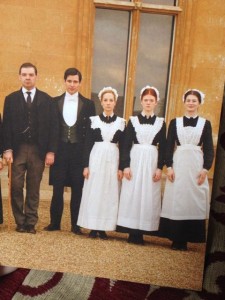
The fourth series of Downton has just hit our screens in the UK and the fans, myself included here, were giddy with excitement at the emotional advert played weeks before the first episode aired (what on earth will happen to Lady Mary now that Cousin Matthew has passed away unexpectedly?!), what else other than terrible "talent" shows do we have to look forward to this autumn?… I rest my case.
Downton Abbey is based on the aristocratic "Crawley" family and their servants in their country estate in Yorkshire, complete with tears and tantrums and the odd death thrown in for good TV viewing, it's stupendously addictive. From the inspiring evening wear and dinner party tables, through to the
etiquette and service from the family, staff and their visitors and even the one liners and quips from the Dowager Countess of Grantham (Dame Maggie Smith) that would have anybody chuckling who cared to give it a go.
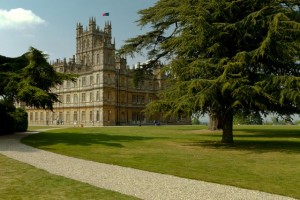
Today I want to talk about staff roles within the Downton Abbey Household, as sometimes you can actually find yourself wondering what work they have time to do between dramas! These last two episodes of Downton have really been rather difficult to watch, without giving anything away to anybody who hasn't yet seen this fourth series. It has taken, I feel, a little time to get going and is setting a slower pace to lay down the newest story lines, of which are a little darker than previous episodes. With this, it's been a tricky business to know how to start off a new blog post, so I wanted to keep this one light hearted and touch more on the educational side for a moment rather than the episodes themselves on this occasion.
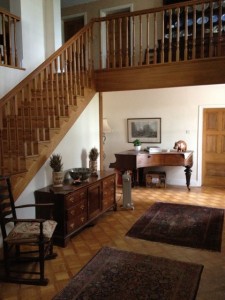
With my new interest and passion in
private household management, I find the
roles and duties of each member of staff in a large house intriguing and inspiring in equal measures. But it can sometimes be confusing as to what each member of staff actually does within their busy day, so here is my own interpretation of the main household duties in a large home such as Downton Abbey.
Downton Abbey Job Specifications: Firstly, the person who would reign over the entire house was in fact the
lady of the house, with her three principles being the butler, the housekeeper and the cook. If there were any arrangements or problems to be discussed, she would speak to them in that particular order.
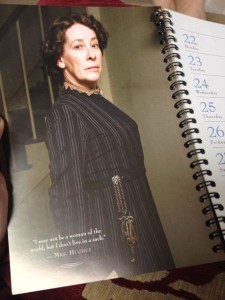 The Butler aka Mr Carson
The Butler aka Mr Carson The butler would oversee the pantry staff, (so the footmen, hallboy, etc) and was in charge of the front of the house, rather than behind the scenes. The butler (and the housekeeper) were well respected figures within the home and would tend to be the longest serving members of staff, sometimes known to serve a family for up to 30 or forty years. Until the mid-1920s the butler would wear a grey morning tailcoat with a cutaway front over a pair of grey trousers, but after this time he would traditionally wear a black evening tailcoat all the time and in the evening he would change into black trousers to match. The butler would be in the pantry, usually with the footmen, sometimes with a small adjoining room for him to use as an office to write up his inventories, but would usually be a married man so would go home at night unless very busy, in which he would sleep in the pantry office if required.
The Housekeeper aka Mrs Hughes The housekeeper would oversee the housemaids and the stillroom maids, (women who made cakes and preserves in a special room set aside just for this task) she would look after the household linen and was responsible for the staff living quarters. Housekeepers could actually be very lonely people, usually spinsters, but interestingly would always be addressed as a "Mrs" as a sign of respect from her staff. Men's and women's quarters were kept apart in every household and before a man could get anywhere near to the women's rooms, he had the housekeeper to answer to first. Even the women in the staff quarters needed her permission to visited each other before they could step foot in each others' rooms, it was a very strict rule of the house.
The Cook aka Mrs Patmore & Mrs Bird The cook (or chef in more recent days) would oversee the kitchen staff and kitchen maids, would also be addressed as a "Mrs" even as a spinster as a mark of respect (as per the housekeeper) but could be very ill-mannered (as could any member of staff as we see at Downton!) due to the stress and timings in the kitchen. As a result, a cook wouldn't tend to stay as long in a house before moving onto a "better promise" in a new home. The pantry would be, traditionally, situated between the "upstairs" and "downstairs", almost as a dividing line across the home that everybody understood and would respect, everybody knew their place.
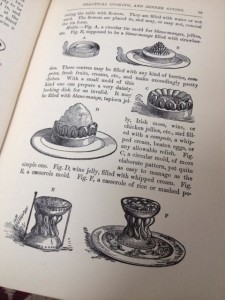 The Valet aka Mr Bates & Mr Molesley
The Valet aka Mr Bates & Mr Molesley A valet was very close to his employer and as a result, some staff members might be wary of him (we see this in Downton with the mysterious Mr Bates) so the servants would watch what they say around him. Traditionally, the valet would eat with the housekeeper, lady's maid and butler separately to the other members of staff. He would carry out similar duties to the Lady's Maid, but perhaps even shave his employer if required, but he could also be responsible for helping with travel and financial arrangements too.
The Lady's Maid aka Ms O'Brien Every single lady would have a lady's maid and her role was very similar to a valet and would be addressed by the Lady of the house by her surname, but as "Miss" by junior servants in the house. She would help with her lady's appearance such as hair, makeup, clothing & jewellery, as well as be the person that would sew and mend or alter garments, through to drawing her mistress a bath. She would not dust or sweep, these were duties for the housemaid to carry out. (In Downton Miss O'Brien is sometimes seen smoking at the front door, however, at that time women would not be seen to be smoking and if they did it was very rare to see them doing it in public).
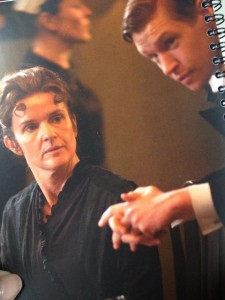 The Footmen aka William, Alfred & Jimmy
The Footmen aka William, Alfred & Jimmy The sons of the house would be looked after by the footmen, as would visiting male guests of the home if they didn't have a valet of their own with them. The first job of the day was likely to be waking the gents up, brushing their clothes and laying them out ready to wear and going back later on to do the same for dinner. They would also lay the table for all meals and clear it once each meal was finished and would serve the food at lunch and at dinner. They may also be asked to lay the table for tea and serve drinks before dinner if required. The footman would also answer the door, greet guests, answer the telephone (once it had arrived in the family home) and waited on the family and guests throughout the day, depending on their needs. Only the very rich household would be able to afford footmen.
The Head Housemaid aka Anna Bates Also known as the younger lady's maid, would look after the daughters of the house and would be beneath the lady's maid, (confused yet? ; ) but seen as equal ranking to the first footman. Her role was a senior position, carrying out duties such as assisting the daughters of the home where needed and also some light housework to help her team with the dusting, polishing, changing of beds, etc and she would report directly to the Housekeeper.
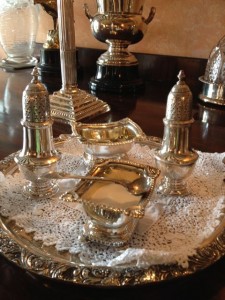 The Housemaids aka Gwen Sawson & Ethel Parks
The Housemaids aka Gwen Sawson & Ethel Parks If visiting female guests stayed at the house without theirs, then the housemaids would also look after them during their visit. In ranking, the second housemaid would be equal to the second footman, the third equal again, and so on - some homes could have up to seven housemaids in total, depending on the size of the house. The housemaids were present to ensure a smooth running of the drawing room, making sure everything was in good working order and that furniture was kept dusted and polished. Curtains, chair coverings, flower arrangements and ornaments were checked closely and the younger housemaids had to do the hard work, such as cleaning the grates (I've cleaned one myself and it's hard work!), carrying coal, and laying & stoking fires.
The Kitchen Maid or Assistant Cook aka Daisy Mason The first kitchen maid would work directly under the cook and would be equal to the first footman, the second would be equal to the second footman, again as above. The kitchen in a great house would traditionally be fitted away from the main living quarters so that smells would not waft upstairs into the family quarters, some even connected with underground passages which would ensure a quick-cooling of hot meals on serving!
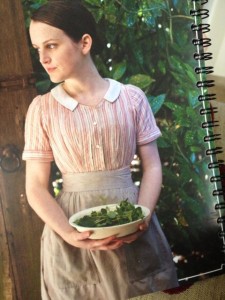 The Scullery Maid aka Ivy Stuart
The Scullery Maid aka Ivy Stuart The scullery maid would be there to prepare the vegetables for cooking, wash the pots and pans and was on the same ranking as a hallboy.
The Chauffeur aka Tom Branson Once horse and carriage was pushed aside for the motor cars of a more modern era, a chauffeur would be needed, not only to drive the guests and family members around, but also used as a mechanic to keep on top of these new toys. He would also ensure that the cars were topped up with petrol and ready to leave a moments notice.
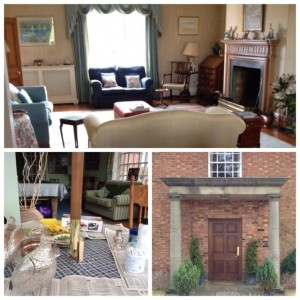 The Hall Boy
The Hall Boy A hallboy would traditionally wear a dark grey flecked suit, known more commonly as a morning suit and every other male staff member would own one of these. A footman would also wear this when working at the back of house carrying out chores such as cleaning the silver or brass, but whilst he was serving the family, he would wear his livery, whereas a valet would only ever wear the morning suit. He was the lowest ranked position in the house and would work up to 16 hours a day, seven days a week carrying out the dirty work such a emptying chamber pots and potentially cleaning boots. Usually a boy or teenager at the eldest, hence the name " Hall Boy".

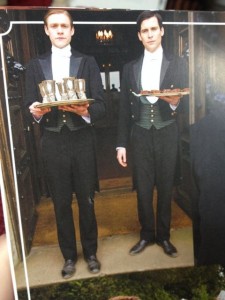
If I were to have worked in a large household in the 1920's, I think I would have been a Head Housemaid, I like the idea of dressing the ladies of the house and being respected by them as well as the servants under my position.
What role would you (or perhaps you have or do currently) undertake in a large household? - Do leave a comment below to share.
If you enjoyed this blog post, you may enjoy these too: Afternoon Tea with Downton Abbey: Series 4 - Episode 1 (The Manual Whisk & Giggle Cake Recipe) Afternoon Tea with Downton Abbey: Series 4 - Episode 2 ( The Downton Cast on Twitter)
 The fourth series of Downton has just hit our screens in the UK and the fans, myself included here, were giddy with excitement at the emotional advert played weeks before the first episode aired (what on earth will happen to Lady Mary now that Cousin Matthew has passed away unexpectedly?!), what else other than terrible "talent" shows do we have to look forward to this autumn?… I rest my case. Downton Abbey is based on the aristocratic "Crawley" family and their servants in their country estate in Yorkshire, complete with tears and tantrums and the odd death thrown in for good TV viewing, it's stupendously addictive. From the inspiring evening wear and dinner party tables, through to the etiquette and service from the family, staff and their visitors and even the one liners and quips from the Dowager Countess of Grantham (Dame Maggie Smith) that would have anybody chuckling who cared to give it a go.
The fourth series of Downton has just hit our screens in the UK and the fans, myself included here, were giddy with excitement at the emotional advert played weeks before the first episode aired (what on earth will happen to Lady Mary now that Cousin Matthew has passed away unexpectedly?!), what else other than terrible "talent" shows do we have to look forward to this autumn?… I rest my case. Downton Abbey is based on the aristocratic "Crawley" family and their servants in their country estate in Yorkshire, complete with tears and tantrums and the odd death thrown in for good TV viewing, it's stupendously addictive. From the inspiring evening wear and dinner party tables, through to the etiquette and service from the family, staff and their visitors and even the one liners and quips from the Dowager Countess of Grantham (Dame Maggie Smith) that would have anybody chuckling who cared to give it a go.  Today I want to talk about staff roles within the Downton Abbey Household, as sometimes you can actually find yourself wondering what work they have time to do between dramas! These last two episodes of Downton have really been rather difficult to watch, without giving anything away to anybody who hasn't yet seen this fourth series. It has taken, I feel, a little time to get going and is setting a slower pace to lay down the newest story lines, of which are a little darker than previous episodes. With this, it's been a tricky business to know how to start off a new blog post, so I wanted to keep this one light hearted and touch more on the educational side for a moment rather than the episodes themselves on this occasion.
Today I want to talk about staff roles within the Downton Abbey Household, as sometimes you can actually find yourself wondering what work they have time to do between dramas! These last two episodes of Downton have really been rather difficult to watch, without giving anything away to anybody who hasn't yet seen this fourth series. It has taken, I feel, a little time to get going and is setting a slower pace to lay down the newest story lines, of which are a little darker than previous episodes. With this, it's been a tricky business to know how to start off a new blog post, so I wanted to keep this one light hearted and touch more on the educational side for a moment rather than the episodes themselves on this occasion.  With my new interest and passion in private household management, I find the roles and duties of each member of staff in a large house intriguing and inspiring in equal measures. But it can sometimes be confusing as to what each member of staff actually does within their busy day, so here is my own interpretation of the main household duties in a large home such as Downton Abbey. Downton Abbey Job Specifications: Firstly, the person who would reign over the entire house was in fact the lady of the house, with her three principles being the butler, the housekeeper and the cook. If there were any arrangements or problems to be discussed, she would speak to them in that particular order.
With my new interest and passion in private household management, I find the roles and duties of each member of staff in a large house intriguing and inspiring in equal measures. But it can sometimes be confusing as to what each member of staff actually does within their busy day, so here is my own interpretation of the main household duties in a large home such as Downton Abbey. Downton Abbey Job Specifications: Firstly, the person who would reign over the entire house was in fact the lady of the house, with her three principles being the butler, the housekeeper and the cook. If there were any arrangements or problems to be discussed, she would speak to them in that particular order.  The Butler aka Mr Carson The butler would oversee the pantry staff, (so the footmen, hallboy, etc) and was in charge of the front of the house, rather than behind the scenes. The butler (and the housekeeper) were well respected figures within the home and would tend to be the longest serving members of staff, sometimes known to serve a family for up to 30 or forty years. Until the mid-1920s the butler would wear a grey morning tailcoat with a cutaway front over a pair of grey trousers, but after this time he would traditionally wear a black evening tailcoat all the time and in the evening he would change into black trousers to match. The butler would be in the pantry, usually with the footmen, sometimes with a small adjoining room for him to use as an office to write up his inventories, but would usually be a married man so would go home at night unless very busy, in which he would sleep in the pantry office if required. The Housekeeper aka Mrs Hughes The housekeeper would oversee the housemaids and the stillroom maids, (women who made cakes and preserves in a special room set aside just for this task) she would look after the household linen and was responsible for the staff living quarters. Housekeepers could actually be very lonely people, usually spinsters, but interestingly would always be addressed as a "Mrs" as a sign of respect from her staff. Men's and women's quarters were kept apart in every household and before a man could get anywhere near to the women's rooms, he had the housekeeper to answer to first. Even the women in the staff quarters needed her permission to visited each other before they could step foot in each others' rooms, it was a very strict rule of the house. The Cook aka Mrs Patmore & Mrs Bird The cook (or chef in more recent days) would oversee the kitchen staff and kitchen maids, would also be addressed as a "Mrs" even as a spinster as a mark of respect (as per the housekeeper) but could be very ill-mannered (as could any member of staff as we see at Downton!) due to the stress and timings in the kitchen. As a result, a cook wouldn't tend to stay as long in a house before moving onto a "better promise" in a new home. The pantry would be, traditionally, situated between the "upstairs" and "downstairs", almost as a dividing line across the home that everybody understood and would respect, everybody knew their place.
The Butler aka Mr Carson The butler would oversee the pantry staff, (so the footmen, hallboy, etc) and was in charge of the front of the house, rather than behind the scenes. The butler (and the housekeeper) were well respected figures within the home and would tend to be the longest serving members of staff, sometimes known to serve a family for up to 30 or forty years. Until the mid-1920s the butler would wear a grey morning tailcoat with a cutaway front over a pair of grey trousers, but after this time he would traditionally wear a black evening tailcoat all the time and in the evening he would change into black trousers to match. The butler would be in the pantry, usually with the footmen, sometimes with a small adjoining room for him to use as an office to write up his inventories, but would usually be a married man so would go home at night unless very busy, in which he would sleep in the pantry office if required. The Housekeeper aka Mrs Hughes The housekeeper would oversee the housemaids and the stillroom maids, (women who made cakes and preserves in a special room set aside just for this task) she would look after the household linen and was responsible for the staff living quarters. Housekeepers could actually be very lonely people, usually spinsters, but interestingly would always be addressed as a "Mrs" as a sign of respect from her staff. Men's and women's quarters were kept apart in every household and before a man could get anywhere near to the women's rooms, he had the housekeeper to answer to first. Even the women in the staff quarters needed her permission to visited each other before they could step foot in each others' rooms, it was a very strict rule of the house. The Cook aka Mrs Patmore & Mrs Bird The cook (or chef in more recent days) would oversee the kitchen staff and kitchen maids, would also be addressed as a "Mrs" even as a spinster as a mark of respect (as per the housekeeper) but could be very ill-mannered (as could any member of staff as we see at Downton!) due to the stress and timings in the kitchen. As a result, a cook wouldn't tend to stay as long in a house before moving onto a "better promise" in a new home. The pantry would be, traditionally, situated between the "upstairs" and "downstairs", almost as a dividing line across the home that everybody understood and would respect, everybody knew their place.  The Valet aka Mr Bates & Mr Molesley A valet was very close to his employer and as a result, some staff members might be wary of him (we see this in Downton with the mysterious Mr Bates) so the servants would watch what they say around him. Traditionally, the valet would eat with the housekeeper, lady's maid and butler separately to the other members of staff. He would carry out similar duties to the Lady's Maid, but perhaps even shave his employer if required, but he could also be responsible for helping with travel and financial arrangements too. The Lady's Maid aka Ms O'Brien Every single lady would have a lady's maid and her role was very similar to a valet and would be addressed by the Lady of the house by her surname, but as "Miss" by junior servants in the house. She would help with her lady's appearance such as hair, makeup, clothing & jewellery, as well as be the person that would sew and mend or alter garments, through to drawing her mistress a bath. She would not dust or sweep, these were duties for the housemaid to carry out. (In Downton Miss O'Brien is sometimes seen smoking at the front door, however, at that time women would not be seen to be smoking and if they did it was very rare to see them doing it in public).
The Valet aka Mr Bates & Mr Molesley A valet was very close to his employer and as a result, some staff members might be wary of him (we see this in Downton with the mysterious Mr Bates) so the servants would watch what they say around him. Traditionally, the valet would eat with the housekeeper, lady's maid and butler separately to the other members of staff. He would carry out similar duties to the Lady's Maid, but perhaps even shave his employer if required, but he could also be responsible for helping with travel and financial arrangements too. The Lady's Maid aka Ms O'Brien Every single lady would have a lady's maid and her role was very similar to a valet and would be addressed by the Lady of the house by her surname, but as "Miss" by junior servants in the house. She would help with her lady's appearance such as hair, makeup, clothing & jewellery, as well as be the person that would sew and mend or alter garments, through to drawing her mistress a bath. She would not dust or sweep, these were duties for the housemaid to carry out. (In Downton Miss O'Brien is sometimes seen smoking at the front door, however, at that time women would not be seen to be smoking and if they did it was very rare to see them doing it in public).  The Footmen aka William, Alfred & Jimmy The sons of the house would be looked after by the footmen, as would visiting male guests of the home if they didn't have a valet of their own with them. The first job of the day was likely to be waking the gents up, brushing their clothes and laying them out ready to wear and going back later on to do the same for dinner. They would also lay the table for all meals and clear it once each meal was finished and would serve the food at lunch and at dinner. They may also be asked to lay the table for tea and serve drinks before dinner if required. The footman would also answer the door, greet guests, answer the telephone (once it had arrived in the family home) and waited on the family and guests throughout the day, depending on their needs. Only the very rich household would be able to afford footmen. The Head Housemaid aka Anna Bates Also known as the younger lady's maid, would look after the daughters of the house and would be beneath the lady's maid, (confused yet? ; ) but seen as equal ranking to the first footman. Her role was a senior position, carrying out duties such as assisting the daughters of the home where needed and also some light housework to help her team with the dusting, polishing, changing of beds, etc and she would report directly to the Housekeeper.
The Footmen aka William, Alfred & Jimmy The sons of the house would be looked after by the footmen, as would visiting male guests of the home if they didn't have a valet of their own with them. The first job of the day was likely to be waking the gents up, brushing their clothes and laying them out ready to wear and going back later on to do the same for dinner. They would also lay the table for all meals and clear it once each meal was finished and would serve the food at lunch and at dinner. They may also be asked to lay the table for tea and serve drinks before dinner if required. The footman would also answer the door, greet guests, answer the telephone (once it had arrived in the family home) and waited on the family and guests throughout the day, depending on their needs. Only the very rich household would be able to afford footmen. The Head Housemaid aka Anna Bates Also known as the younger lady's maid, would look after the daughters of the house and would be beneath the lady's maid, (confused yet? ; ) but seen as equal ranking to the first footman. Her role was a senior position, carrying out duties such as assisting the daughters of the home where needed and also some light housework to help her team with the dusting, polishing, changing of beds, etc and she would report directly to the Housekeeper.  The Housemaids aka Gwen Sawson & Ethel Parks If visiting female guests stayed at the house without theirs, then the housemaids would also look after them during their visit. In ranking, the second housemaid would be equal to the second footman, the third equal again, and so on - some homes could have up to seven housemaids in total, depending on the size of the house. The housemaids were present to ensure a smooth running of the drawing room, making sure everything was in good working order and that furniture was kept dusted and polished. Curtains, chair coverings, flower arrangements and ornaments were checked closely and the younger housemaids had to do the hard work, such as cleaning the grates (I've cleaned one myself and it's hard work!), carrying coal, and laying & stoking fires. The Kitchen Maid or Assistant Cook aka Daisy Mason The first kitchen maid would work directly under the cook and would be equal to the first footman, the second would be equal to the second footman, again as above. The kitchen in a great house would traditionally be fitted away from the main living quarters so that smells would not waft upstairs into the family quarters, some even connected with underground passages which would ensure a quick-cooling of hot meals on serving!
The Housemaids aka Gwen Sawson & Ethel Parks If visiting female guests stayed at the house without theirs, then the housemaids would also look after them during their visit. In ranking, the second housemaid would be equal to the second footman, the third equal again, and so on - some homes could have up to seven housemaids in total, depending on the size of the house. The housemaids were present to ensure a smooth running of the drawing room, making sure everything was in good working order and that furniture was kept dusted and polished. Curtains, chair coverings, flower arrangements and ornaments were checked closely and the younger housemaids had to do the hard work, such as cleaning the grates (I've cleaned one myself and it's hard work!), carrying coal, and laying & stoking fires. The Kitchen Maid or Assistant Cook aka Daisy Mason The first kitchen maid would work directly under the cook and would be equal to the first footman, the second would be equal to the second footman, again as above. The kitchen in a great house would traditionally be fitted away from the main living quarters so that smells would not waft upstairs into the family quarters, some even connected with underground passages which would ensure a quick-cooling of hot meals on serving!  The Scullery Maid aka Ivy Stuart The scullery maid would be there to prepare the vegetables for cooking, wash the pots and pans and was on the same ranking as a hallboy. The Chauffeur aka Tom Branson Once horse and carriage was pushed aside for the motor cars of a more modern era, a chauffeur would be needed, not only to drive the guests and family members around, but also used as a mechanic to keep on top of these new toys. He would also ensure that the cars were topped up with petrol and ready to leave a moments notice.
The Scullery Maid aka Ivy Stuart The scullery maid would be there to prepare the vegetables for cooking, wash the pots and pans and was on the same ranking as a hallboy. The Chauffeur aka Tom Branson Once horse and carriage was pushed aside for the motor cars of a more modern era, a chauffeur would be needed, not only to drive the guests and family members around, but also used as a mechanic to keep on top of these new toys. He would also ensure that the cars were topped up with petrol and ready to leave a moments notice.  The Hall Boy A hallboy would traditionally wear a dark grey flecked suit, known more commonly as a morning suit and every other male staff member would own one of these. A footman would also wear this when working at the back of house carrying out chores such as cleaning the silver or brass, but whilst he was serving the family, he would wear his livery, whereas a valet would only ever wear the morning suit. He was the lowest ranked position in the house and would work up to 16 hours a day, seven days a week carrying out the dirty work such a emptying chamber pots and potentially cleaning boots. Usually a boy or teenager at the eldest, hence the name " Hall Boy".
The Hall Boy A hallboy would traditionally wear a dark grey flecked suit, known more commonly as a morning suit and every other male staff member would own one of these. A footman would also wear this when working at the back of house carrying out chores such as cleaning the silver or brass, but whilst he was serving the family, he would wear his livery, whereas a valet would only ever wear the morning suit. He was the lowest ranked position in the house and would work up to 16 hours a day, seven days a week carrying out the dirty work such a emptying chamber pots and potentially cleaning boots. Usually a boy or teenager at the eldest, hence the name " Hall Boy". 
 If I were to have worked in a large household in the 1920's, I think I would have been a Head Housemaid, I like the idea of dressing the ladies of the house and being respected by them as well as the servants under my position. What role would you (or perhaps you have or do currently) undertake in a large household? - Do leave a comment below to share. If you enjoyed this blog post, you may enjoy these too: Afternoon Tea with Downton Abbey: Series 4 - Episode 1 (The Manual Whisk & Giggle Cake Recipe) Afternoon Tea with Downton Abbey: Series 4 - Episode 2 ( The Downton Cast on Twitter)
If I were to have worked in a large household in the 1920's, I think I would have been a Head Housemaid, I like the idea of dressing the ladies of the house and being respected by them as well as the servants under my position. What role would you (or perhaps you have or do currently) undertake in a large household? - Do leave a comment below to share. If you enjoyed this blog post, you may enjoy these too: Afternoon Tea with Downton Abbey: Series 4 - Episode 1 (The Manual Whisk & Giggle Cake Recipe) Afternoon Tea with Downton Abbey: Series 4 - Episode 2 ( The Downton Cast on Twitter) 
No comments:
Post a Comment